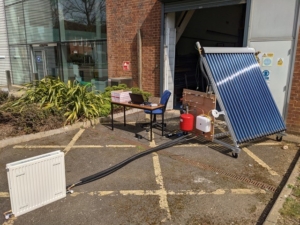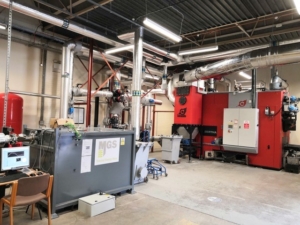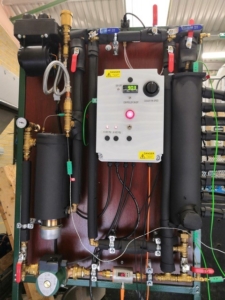Renewable heating and cooling to slash carbon emissions
07/07/2022

Domestic/commercial applications: Energy consumption in the building sector accounts for 40% of the total energy consumption worldwide. The UK has set the goal of achieving NetZero by 2050. In 2012, the UK had a total greenhouse gas emission level of 613 MtCO2e. Residential buildings and non-residential buildings have shares of 12% and 3%, respectively. There is an urgent demand to increase the share of renewable energy sources and reduce carbon emissions, which is essential to the energy efficiency policy in the UK. “Greener Buildings” is part of the UK Prime Minister’s ten-point plan (point 7) to achieve a green industrial revolution in the UK, with an aim of attracting around £11bn private investment in 2020, supporting approximately 50,000 jobs in 2030 and savings of 71MtCO2e between 2023 and 2032. At present, building cooling and heating is mostly achieved by electricity and fuel such as natural gas. Solar energy combined with thermal energy storage has the potential to meet the combined heating and cooling demand of buildings by greener means.
More recently Cranfield University and EGB Engineering have been successful in securing funding from Innovate UK for industrial research into low-carbon renewable heating and cooling systems to decarbonise public and commercial buildings. The development of thermal energy storage via phase change material, and solar evacuated tube collectors to capture renewable heat and turn them into cooling through an absorption chiller to increase the renewable share in the building cooling applications. This project has supported the construction of several components and testing its performance in a realistic environment: solar evacuated tube collectors and the heat storage system (figure 1).



Figure 1: 1.2 kW evacuated tube collector, 120kWth PCM storage connected to Cranfield heat networks and 1kW lab scale PCM capability.
Waste heat recovery: In any conventional power generation cycle (eg; steam Rankine cycle) two-thirds of the energy is dumped into the atmosphere, yet this low-quality heat can be captured and utilised to operate the thermal driven absorption chillers and provide the cooling loads to nearby buildings. This novel approach formed part of an EU FP7 funded project (MATS) to design an absorption chiller from a 1MWe turbine waste heat and understand its thermodynamic performance. The follow-on project supported by Newton-British council with EJUST to build an integrated community level system for Egypt, 10kW electricity, 1m3/day of water 10 kW cooling load including cold storage.
Overall, these activities helped to assess the market potential of this technology, and to increase the proportion of renewable energy in the heating and cooling sectors and reduce the reliance on fossil fuels. The group is exploring options for the integration of these designs into Cranfield’s own heat/cooling networks.
Categories & Tags:
Leave a comment on this post:
You might also like…
Keren Tuv: My Cranfield experience studying Renewable Energy
Hello, my name is Keren, I am from London, UK, and I am studying Renewable Energy MSc. My journey to discovering Cranfield University began when I first decided to return to academia to pursue ...
3D Metal Manufacturing in space: A look into the future
David Rico Sierra, Research Fellow in Additive Manufacturing, was recently involved in an exciting project to manufacture parts using 3D printers in space. Here he reflects on his time working with Airbus in Toulouse… ...
A Legacy of Courage: From India to Britain, Three Generations Find Their Home
My story begins with my grandfather, who plucked up the courage to travel aboard at the age of 22 and start a new life in the UK. I don’t think he would have thought that ...
Cranfield to JLR: mastering mechatronics for a dream career
My name is Jerin Tom, and in 2023 I graduated from Cranfield with an MSc in Automotive Mechatronics. Originally from India, I've always been fascinated by the world of automobiles. Why Cranfield and the ...
Bringing the vision of advanced air mobility closer to reality
Experts at Cranfield University led by Professor Antonios Tsourdos, Head of the Autonomous and Cyber-Physical Systems Centre, are part of the Air Mobility Ecosystem Consortium (AMEC), which aims to demonstrate the commercial and operational ...
Using grey literature in your research: A short guide
As you research and write your thesis, you might come across, or be looking for, ‘grey literature’. This is quite simply material that is either unpublished, or published but not in a commercial form. Types ...






